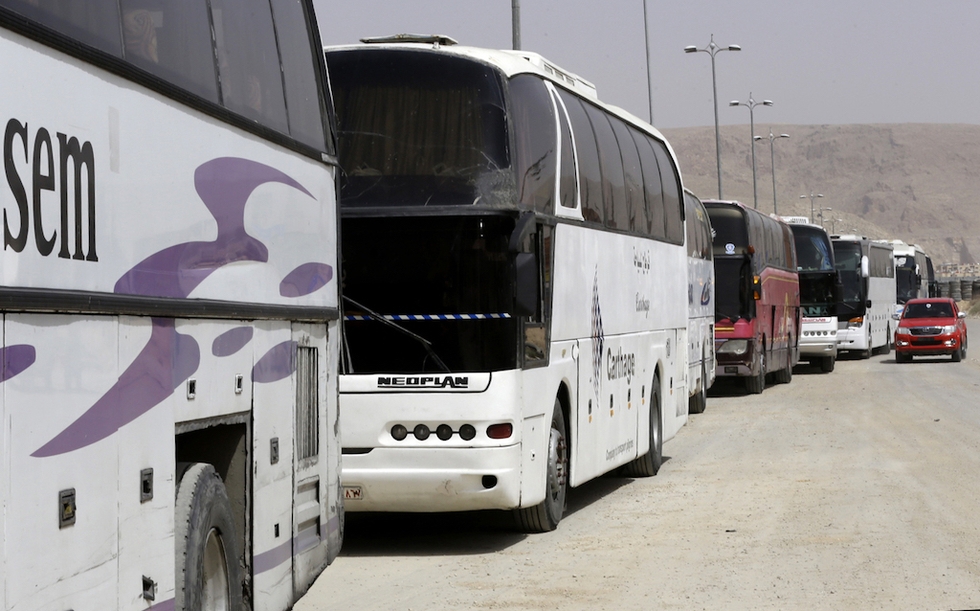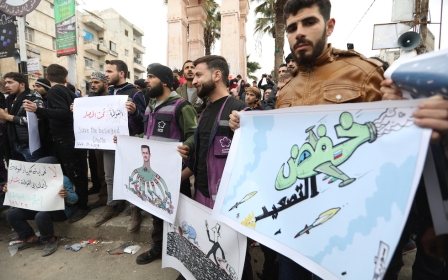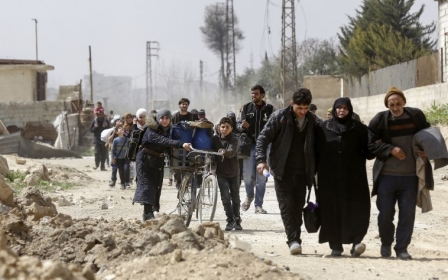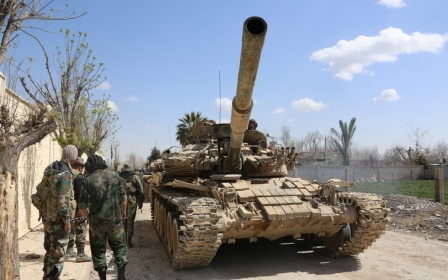Syria rebels begin Ghouta evacuation: State media

Syrian rebels began leaving Eastern Ghouta on Thursday, state media said, under the first such evacuation deal from the battered opposition enclave outside Damascus.
State television announced the "departure of 547 people from Harasta so far, including 88 fighters".
A military source told AFP the rebels and accompanying civilians had boarded buses and were waiting in a buffer zone to cross over into government-controlled territory.
The Russian Defence Ministry said more than 5,000 civilians left Syria's Eastern Ghouta on Thursday, RIA agency reported.
A Reuters witness said 15 buses had driven into the town of Harasta to transport fighters and their families to opposition areas in northwestern Syria in a deal brokered by the government's ally Russia.
Meanwhile, the Syrian Observatory for Human Rights monitoring group said more than 4,000 people had fled the larger rebel-held town of Douma since Wednesday, crossing over into government-held territory.
The Ahrar al-Sham group's decision to surrender Harasta leaves only Douma and another rebel pocket in Eastern Ghouta that includes the towns of Jobar, Ein Terma, Arbin and Zamalka.
They are all that remain of the main insurgent stronghold near the Syrian capital Damascus, the biggest prize for President Bashar al-Assad in his fight against the rebels since the recapture of Aleppo in late 2016.
Ceasefire agreed for enclave
A ceasefire has been agreed in principle for the enclave of Syria's eastern Ghouta under the control of the rebel group Failaq al-Rahman to stop civilian suffering, the group's spokesman said on Thursday.
"Failaq al-Rahman communicated through the U.N. and the U.N. reached a ceasefire deal in principle to begin at 00:00 Damascus time (2200 GMT) on Friday, 23rd March, 2018, so that there will be a final negotiating session ... in order to negotiate with the Russian side about finding a solution to guarantee the safety of civilians and to guarantee that their suffering stops," Wael Alwan, Failaq al-Rahman's Istanbul-based spokesman, told Reuters in a recorded voice message.
A committee from the enclave consisting of a delegation from Failaq al-Rahman and civilian institutions will take part in the negotiations session, he said.
Air strikes
Air strikes pummelled parts of Eastern Ghouta on Thursday morning, striking Arbin and Zamalka and killing 19 people, according to the Observatory.
An army officer interviewed on state television urged rebels who had not yet negotiated a deal to quit.
"Death is coming for you if you do not surrender," he said.
On Sunday, Assad drove himself to a newly captured battlefront in eastern Ghouta, a demonstration of his seemingly unassailable position in the war that has been going his way since Russia sent its air force to help him in 2015.
'Death is coming for you if you do not surrender'
- Army officer
The deal to surrender Harasta is the first by Eastern Ghouta rebels and began on Thursday with a prisoner swap. In an interview with state television, a Syrian soldier freed by rebels wept and thanked God and the army for his release.
The Reuters witness at the crossing with Harasta said the army had removed barriers from the old frontline lying across the road into the town to allow the buses to pass.
The Russian Defence Ministry website showed what it said was live footage from the al-Wafideen crossing point from Douma into government areas.
Over a period of several minutes, it showed dozens of people in small groups coming around a corner and trekking along the dirt road past armed soldiers.
Some bore bundles of their possessions, others carried small children or pushed prams.
At one point in the road a man could be seen in a red shirt with the logo of the Syrian Arab Red Crescent.
Douma is the most populous area in Eastern Ghouta, and for more than a week it has been entirely surrounded by the government. The Jaish al-Islam rebel group that holds the town has said it is determined to fight on after a month-long government offensive that has taken 70 percent of the former opposition enclave in Eastern Ghouta.
However, the Observatory said people leaving the area were doing so under an agreement between the group and the government's closest ally Russia.
Middle East Eye propose une couverture et une analyse indépendantes et incomparables du Moyen-Orient, de l’Afrique du Nord et d’autres régions du monde. Pour en savoir plus sur la reprise de ce contenu et les frais qui s’appliquent, veuillez remplir ce formulaire [en anglais]. Pour en savoir plus sur MEE, cliquez ici [en anglais].




